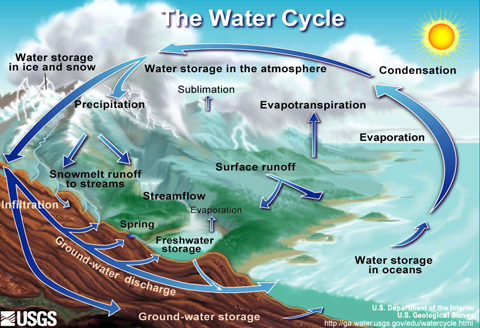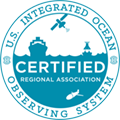Weather & Climate
The ocean has an intimate relationship with atmosphere and as such influences climate and weather strongly. The ocean plays a major role in regulating several geochemical cycles on our planet, including the heat and water cycles. Most of the heat on the surface of the Earth is stored in the tropical waters of the ocean. Atmospheric circulation, such as trade winds, are set up by the release of heat from the ocean into the atmosphere through evaporation and then the release of heat from the atmosphere back down to the ocean or land through condensation and precipitation. Where dry or wet areas of the planet are found is caused in part by the ocean’s affects on atmospheric circulation. Thus, the ocean influences how much rain hits land and fuels hurricanes in the Atlantic Ocean and cyclones in the Pacific Ocean. Disruptions to this heat flow, like during an El Niño or La Niña year, change global weather patterns.

Areas of Emphasis
Maritime Operations |
Coastal Hazards |
Fisheries & Marine Life |
Marine Ecosystems |
Weather & Climate |
Related Topics
Coastal & Marine Spatial Planning
Related NANOOS Products
NOAA Pacific Marine Environmental Lab (PMEL) Carbon Program
The primary mission is to evaluate the variability in air-sea CO2 fluxes by conducting high resolution time-series measurements of atmospheric boundary layer and surface ocean CO2 partial pressure (pCO2).
Columbia River Climatological Atlas
The Climatological Atlas is a scientific project designed to offer insights into multiple scales of variability of the contemporary Columbia River coastal margin, via statistics of an extensive set of indicators. The focus of the Atlas is on indicators for the estuary and plume, but indicators of external forcing are also included for context.
Puget Sound ORCA
Oceanic Remote Chemical Analyzer (ORCA) measures physical, chemical, and biological water characteristics in Hood Canal.
Cha'ba Buoy
Multi-depth moored buoy deployed off La Push, Washington that collects physical, chemical, and biological water variables.
NANOOS members involved in this effort include:
NOAA Northwest Fisheries Science Center
| National Observing System Partners Alliance for Coastal Technologies (ACT) Southeastern Universities Research Association (SURA) Integrated Ocean Observing System IOOS | |||||||

